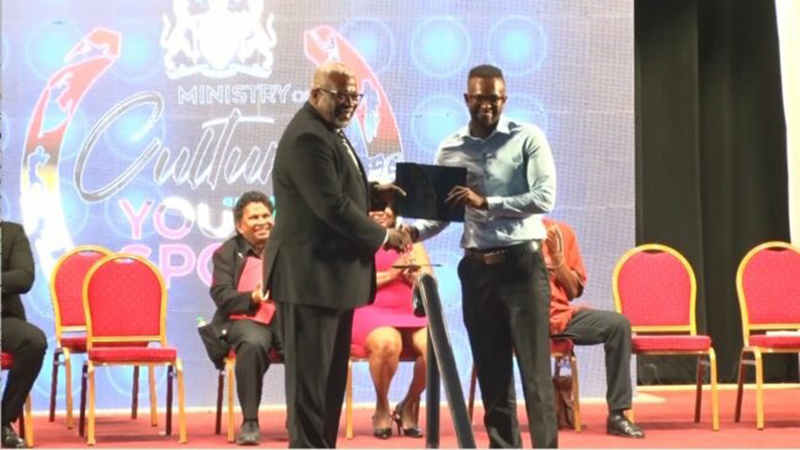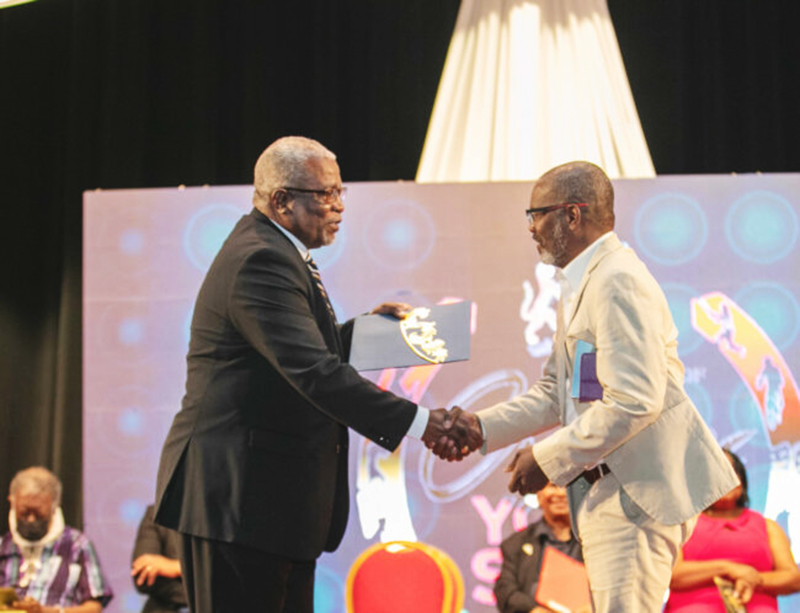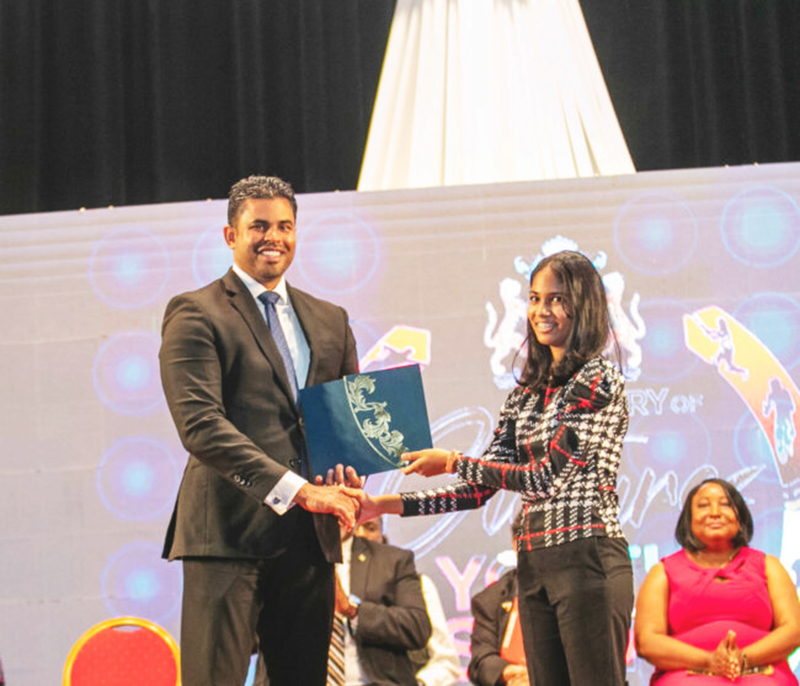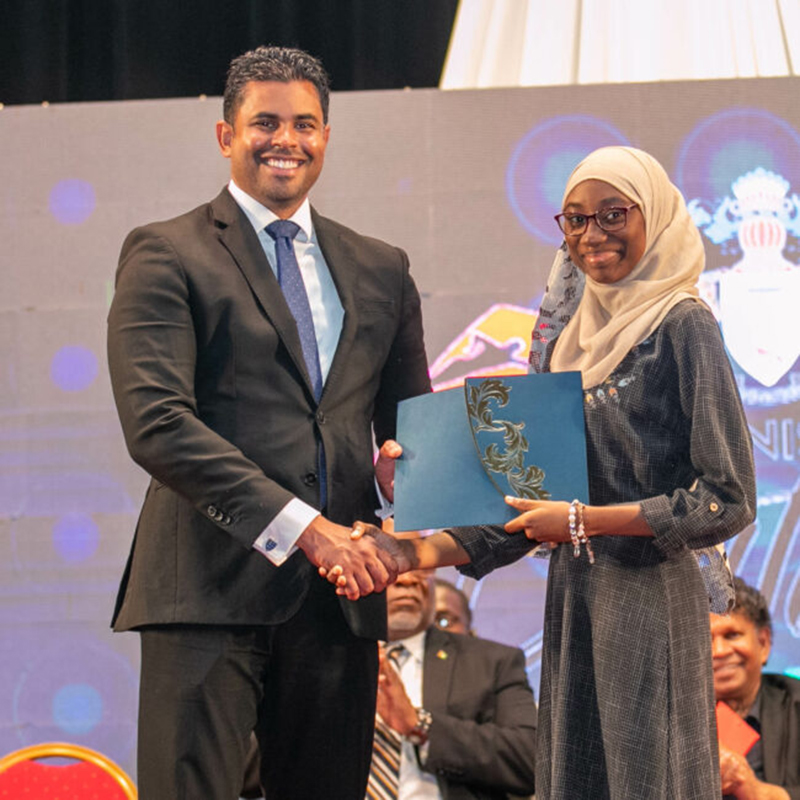It is Friday, February 10 and I have just won the Guyana Prize for Literature in Drama. An unbelievable feat because I am aware of the talented playwrights in our country, including Mosa Telford who copped second prize and was a previous winner. Sonia Yarde and Ras Leon Saul, two thespians with years of experience, tied in third place.
As Professor Ian Robertson was speaking, the lights went out at the National Cultural Centre and the generator was not working. I laughed and laughed because this is a memory I have to reminisce on. A blackout at the award ceremony for writers; perhaps a metaphor for Guyana’s literary community.
Persons scurried upstairs using their phone lights and assembled for food. I had snuck out earlier and grabbed something to eat, saving myself an additional wait to cure hunger.
At the reception, the lights returned. There were cheers; people could see what they were eating and I could easily find the bar. I met Timmia Hearne DeRoy and Celeste Mohammed, two of the judges of drama and fiction respectively. They both said they enjoyed my stories.
The next morning at Castellani House, there was an exhibition of past Guyanese writers who have won the Guyana Prize. Others, like Edgar Mittelholzer came before such a prize was established. There were books and writers that I had never seen or heard of before. I told several writers that it was hypocritical of writers in Guyana (including myself) to lament that their work was not being read, when they had not read a collection of literary history. It’s important for people to look back and see what occupied the imagination of Guyanese creatives to better understand the society. I can tell you that the Bronte sisters had died early and Albert Camus died in a car crash, but I didn’t know Mittelholzer had set himself on fire. I should know more about Guyanese writers and this is a problem. I asked writers how many books they had read from the Guyanese collection. It was probably less than ten books. Writers were appreciative of the exhibition, but felt the books needed to be on sale.
This is a problem that needs to be solved. I scan my brain for solutions. Some of the solutions are not mine, but I have read from other spaces. I had read an article by Harold Bascom, who won the Guyana Prize for Literature in Drama four times. He said a Guyanese publishing house would soon be out of business given our small population and the small readership. Publishers need to make money to keep their business afloat. Hence, a major Caribbean publishing house is needed to help writers in Guyana, he pointed out. The Caribbean has differences but there is also a oneness due to slavery and colonisation. Using the medium of film is another means to keep writers alive. Film critic Andrew Kendall made this point when he said western cinema has consecrated its literature to the screen. African literature usually does not do this and so it tends to have less exposure, he had surmised.
With time, each generation can forget about past writers. I do not know of many literary works that have been translated to film. There is Smile Orange by Trevor Rhone which he adapted from his play and recently, Green Days by the River. The novel was written by Michael Anthony in 1967. An entire generation, including myself, would now know of this work due to that film. Film adaptations should not be done just once either. There should be many and it should be updated often. There are lots of film iterations of Shakespeare’s work keeping it alive. Guyanese and Caribbean writers are deserving of the same but there must be a push by governments and people to keep creative works in the public’s consciousness.
This has been helped to a large extent by the Caribbean Examination Council (CXC). In high school, we were introduced to the works of some Guyanese writers, like Ian McDonald and Martin Carter. However, this is not enough and there is the issue of accommodating other Caribbean writers since it is a regional examination. But books on the syllabus can be rotated and this would introduce students to a variety of writers. Book clubs in schools and universities should also be facilitated to help keep literature alive and conscious in our population. Contemporary writers can also form their own book clubs and revitalise literary history for their benefit. A good book can be spread from word of mouth advertising. These are just several things that can be done.
Another major thing creatives need is accessibility to information for publication of their works. A publisher can help to strengthen work, using marketing and branding to help the book garner sales and an income for the writer. However, I think a strong impetus also falls on a writer to seek out information on publishing and how to get work out in the world. The access to
information is not as difficult as it was decades ago. The internet has brought people closer together and information can be found if sought.
The quality of the books for publication must also be taken into consideration. There are very few opportunities for Guyanese to meet in a space and have their work critiqued and workshopped by experienced writers. The Commonwealth Foundation of Creatives had done this several years ago at Moray House for fiction and drama. It was a much needed workshop for the Guyanese writing fraternity.
The Ministry of Culture, Youth and Sport had a similar idea to conduct these workshops, but this was only for two hours in a single day. While commendable, this was inadequate for writers’ development. It is the beginning of the Guyana Literature Festival; one can only hope that in the years to follow, it will grow and more intensive workshops can be done.
As regards the festival events, there was a need for proper advertising. There was a flyer circulating but that was not enough. Many people were unaware of the literature festival. The list of activities and the shortlist for the Guyana Prize were mainly disseminated via WhatsApp groups a day before the prize-giving ceremony. There was no shortlist of candidates in the media for the Guyana Prize for Literature.
The ministry needs to do a better job at advertising the festival for it to grow. The festival should not only attract creatives who are already in the arts. The information would find them since the Guyanese creative community is small and connected. The aim should be able to spark the imagination outside of this small established community. There are also creative ways that the festival can do this during workshops and lectures to capture a wider community of people.
Imagination and creativity are important elements for learning and the digestibility of information. There was a storytelling aspect of the festival that catered for school children, which I did not attend. Then there were lectures at the festival and these were okay, but if growth is the goal of the festival then resources need to be placed to reach a younger generation of creatives who can find lectures a bit tedious. The world has changed because of the internet. The attention span of people has been shrinking. This is a challenge but I have seen creatives adapt and still try to push literature.
There is a channel on YouTube called Ted-Ed and it animates critiques of classical literature and calls the videos, “Why you Should Read” followed by the name of the book. The animated sequence is usually five minutes long and it is done in a way that sparks your interest to explore the themes a writer is trying to capture.
Guyana is missing this innovation in creativity because of a lack of investment in it. It can be accomplished, but not without investing in creatives so the world can know about the rich talent which exists in this country. The Guyana Literature Festival is a good start but there are still miles to go.









